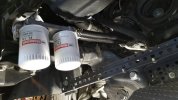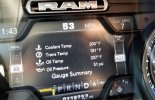Gunner69
Member
Greetings all,
I bought my 2022 Ram 1500 4x4 5.7 new. I have talked about the lubrication of the 5.7 at LENGTH with my local dealership as well as anyone else who claims knowledge of the Hemi 5.7.
I use Wix filters, and the Penns Ultra Platinum Synthetic oil. I recently had a conversation with an actual chemist who does oil analysis and works for a company that makes cam shafts. My query for him was, is the OW-20 good enough for use in AZ. We typically get triple digit summers and that oil seemed off to me and I asked what would be best as I have read many people switch to 5W-30 which makes sense. He advised moving to OW-40 and that would may also help with the dreaded tic.
It is claimed that moving to the OW oils is due to closer tolerances being used now to both save fuel and for emissions etc. I don't know that is true but manufacturers are pushing for economy and smog reasons. Honestly I could care less about either issue, I just want to maintain my engine as best I can. So the correct/best suited lubricants and a reasonable change interval makes sense. I do not abide the whole change the oil when and if the light comes on mentality, and the new trend of NO dipstick is beyond reason for me anyway.
I spoke to a performance engine builder who builds and races Mopar's and his advice was to replace the oil pump with a higher flow unit as the system was not getting enough flow during idle periods. That causes wear, that in turn leads to the tic. I also heard that the oil pump from the Challenger I believe is a better unit and could/would solve the issue.
I have watched HOURS of oil tests and comparisons, as well as for oil filters and it is easy to get off into the weeds. There is apparently no simple answer to these issues. I get oil needs to be able to flow in various environments/temps, and that the oil pump as well as the oil filter do affect that ability to lubricate the engine.
I don't know that this will help find the solution, I just wanted to share what I have found to date, in hope that someone else may have found more information or something that makes good sense.
I bought my 2022 Ram 1500 4x4 5.7 new. I have talked about the lubrication of the 5.7 at LENGTH with my local dealership as well as anyone else who claims knowledge of the Hemi 5.7.
I use Wix filters, and the Penns Ultra Platinum Synthetic oil. I recently had a conversation with an actual chemist who does oil analysis and works for a company that makes cam shafts. My query for him was, is the OW-20 good enough for use in AZ. We typically get triple digit summers and that oil seemed off to me and I asked what would be best as I have read many people switch to 5W-30 which makes sense. He advised moving to OW-40 and that would may also help with the dreaded tic.
It is claimed that moving to the OW oils is due to closer tolerances being used now to both save fuel and for emissions etc. I don't know that is true but manufacturers are pushing for economy and smog reasons. Honestly I could care less about either issue, I just want to maintain my engine as best I can. So the correct/best suited lubricants and a reasonable change interval makes sense. I do not abide the whole change the oil when and if the light comes on mentality, and the new trend of NO dipstick is beyond reason for me anyway.
I spoke to a performance engine builder who builds and races Mopar's and his advice was to replace the oil pump with a higher flow unit as the system was not getting enough flow during idle periods. That causes wear, that in turn leads to the tic. I also heard that the oil pump from the Challenger I believe is a better unit and could/would solve the issue.
I have watched HOURS of oil tests and comparisons, as well as for oil filters and it is easy to get off into the weeds. There is apparently no simple answer to these issues. I get oil needs to be able to flow in various environments/temps, and that the oil pump as well as the oil filter do affect that ability to lubricate the engine.
I don't know that this will help find the solution, I just wanted to share what I have found to date, in hope that someone else may have found more information or something that makes good sense.













